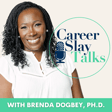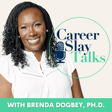
010: Strategies for success as a new and seasoned immigrant (Part 1)
In this episode of the Career Slay Talks podcast, host Brenda Dogbey takes you on an intimate journey through the highs and lows of her immigration story. Whether you're a newcomer or a seasoned immigrant, there's something here for everyone as we delve into the strategies that pave the way for success in Canada
Drawing from her own experiences, Brenda offers a candid look at the challenges faced upon arrival and how these obstacles can be transformed into stepping stones towards a brighter future.
But this isn't just a storytelling episode – get ready to walk away with actionable tips that you can implement immediately. Brenda shares practical advice on harnessing the power of resilience, and finding hidden opportunities within the challenges. These strategies aren't just theoretical; they're battle-tested tools that have helped Brenda and countless others rise above adversity.
No matter where you are in your own immigration journey, this episode promises to inspire, motivate, and equip you with the tools you need not only to survive but to thrive. Join Brenda as she reshapes the immigrant narrative and prove that success is achievable for everyone who dares to dream big.
Tune in to this transformative episode and embark on a journey that's about more than just success – it's about discovering your own strength and resilience in the face of change.





